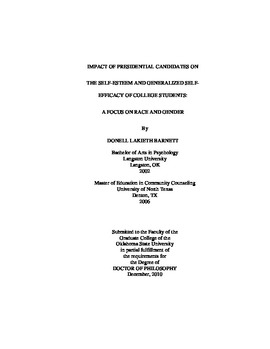| dc.contributor.advisor | Jacobs, Sue C. | |
| dc.contributor.author | Barnett, Donell Lakieth | |
| dc.date.accessioned | 2013-11-26T08:34:10Z | |
| dc.date.available | 2013-11-26T08:34:10Z | |
| dc.date.issued | 2010-12 | |
| dc.identifier.uri | https://hdl.handle.net/11244/7306 | |
| dc.description.abstract | Scope and Method of Study: | |
| dc.description.abstract | This study was an online, experimental study to assess the impact of presidential candidates on the self esteem and general self efficacy of college students. The sample was comprised of African American and Caucasian college students, ages 19-30, and enrolled at three different colleges in the Southwest. Experimental groups were primed with a presidential candidate vignette and compared against matched race and gender control groups. This study made use of vignettes that altered based on race (African American and Caucasian) and gender. With these alterations in the vignette primer, I examined the effect of the presidential candidate vignette on the outcome variables (self esteem and general self efficacy) against matched race and gender control groups. | |
| dc.description.abstract | Findings and Conclusions: | |
| dc.description.abstract | The vignettes failed to produce a significant difference for Caucasian males and females. From this finding I conclude that due to a lack of novelty (i.e. all previous presidents have been Caucasian males) there is no "self concept" boost for Caucasian males. For Caucasian females, the effect may have been nullified by the strong presence of Caucasian women in congress and local government. Further, the effect of these high level exemplars may be limited to career and vocational aspirations of young women as indicated in the literature. The vignette produced significantly higher self efficacy scores for African American males and significantly lower self esteem scores for African American females. African American presidents may promote a greater sense of self efficacy for African American males. However, more research is needed to document the tangible effects of this boost in self efficacy. For African American females, this lowering of self esteem scores points to a "lower self esteem turning into a challenge" process in light of the substantial gains in academia and career that has been observed in this group over the last two decades. In sum, presidential candidates did not have a self concept impact on Caucasians. Presidential candidates do impact the self concept of African Americans although the impact is different between African American males and females. | |
| dc.format | application/pdf | |
| dc.language | en_US | |
| dc.rights | Copyright is held by the author who has granted the Oklahoma State University Library the non-exclusive right to share this material in its institutional repository. Contact Digital Library Services at lib-dls@okstate.edu or 405-744-9161 for the permission policy on the use, reproduction or distribution of this material. | |
| dc.title | Impact of presidential candidates on the self-esteem and generalized self efficacy of college students: A focus on race and gender | |
| dc.contributor.committeeMember | Romans, John S. C. | |
| dc.contributor.committeeMember | McGaha-Garnett, Valerie | |
| dc.contributor.committeeMember | Harrist, Steve | |
| dc.contributor.committeeMember | Kirksey, Jason | |
| osu.filename | Barnett_okstate_0664D_11166.pdf | |
| osu.accesstype | Open Access | |
| dc.type.genre | Dissertation | |
| dc.type.material | Text | |
| dc.subject.keywords | african american | |
| dc.subject.keywords | obama | |
| dc.subject.keywords | presidential election | |
| dc.subject.keywords | self efficacy | |
| dc.subject.keywords | self esteem | |
| dc.subject.keywords | women | |
| thesis.degree.discipline | Counseling Psychology | |
| thesis.degree.grantor | Oklahoma State University | |
